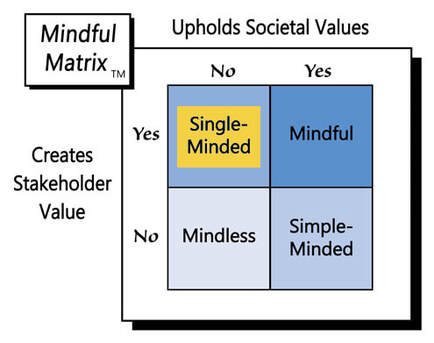author of Honorable Influence - founder of Mindful Marketing
The Professional Golfers’ Association’s (PGA) decision to merge with LIV Golf was a move that virtually no one expected. Even professional golfers and analysts who cover the game were shocked by the news. The PGA’s sudden change of heart, which went from viewing LIV as a bitter rival to a bedfellow also represented for many an epic moral capitulation.
Over the past year, the PGA and LIV have been “at war.” The PGA had threatened to suspend golfers who defected to LIV and even ban them for life. Why such acrimony? Of course, no organization wants a new competitor, especially one that steals its product (golfers) and commandeers its place (golf venues).
However, the PGA’s disdain for LIV was rooted in more than competition-fueled conflict. Many in the veteran golf association, as well as others, took issue with LIV’s funding source – the sovereign wealth fund of Saudi Arabia, the nation of origin for 15 of the 19 hijackers involved in the 9/11 attacks and a country known for human right abuses.
In an interview just a month ago, the PGA’s CEO, Seth Waugh, was heard “trashing” LIV Golf ahead of the PGA Championship. How is such a seemingly irreconcilable relationship so suddenly repaired? One ESPN piece, “How the shocking PGA Tour-LIV Golf deal went down” details the events leading up to the proposed merger and its players, while another describes how the unification, which also includes the DP World Tour (Europe), might solidify the sport long-term.
This Mindful Marketing article doesn’t pretend to know what’s best for the future of professional golf; rather, it aims to ask a more general philosophical question: Was it okay for the PGA to have a moral change of mind?
Of course, it’s not organizations but the individuals that manage them who make decisions, including ethical ones. Most of us have experienced that our initial inclinations are not always optimal. As evidence, we’ve all mistakes and often realized later the option we should have selected.
Imperfect decision-making is a thread that has run continually through human history and often involved ethics. For instance, decisions in favor of racial segregation in the U.S. in the 19th- and 20th century are ones that most Americans now reject, as are the choices that kept women from voting until 1920.
Realizing the error of one’s way and self-correcting a moral stance is a good thing. However, it’s also important to help others understand the reason for the reversal. Intelligent, inquiring people want to know not just that a judgment that was A is now B but why it’s changed That’s where moral reasoning helps.
In a moral argument, a person first identifies a moral standard then suggests one or more alleged facts, which lead to a conclusion, or moral judgment. A month ago, it seemed that many PGA supporters/LIV detractors morally reasoned along the lines of the following:
- Human rights should be upheld. (moral standard)
- Saudi Arabia has not upheld certain human rights. (alleged fact 1)
- LIV Golf’s funding come from the sovereign wealth fund of Saudi Arabia. (alleged fact 2)
- LIV Golf’s funding source taints the league. (alleged fact 3)
- It’s wrong for professional golfers to play for LIV. (moral judgment)
Then, without notice, the PGA reversed course, announcing its merger with LIV and thereby introducing a new moral judgement: It’s fine for professional golfers to play for LIV.
Again, there’s nothing wrong with having a moral change of heart, especially if it’s the result of ethical enlightenment. However, others deserve to know what changed the moral judgment, which is where the PGA fell short of the cup.
A year ago, PGA Tour Commissioner Jay Monahan was invoking the 9/11 terrorist attacks as a main reason to reject LIV. Now, he will reportedly serve as CEO of the newly created company.
Monahan and the PGA have offered little evidence that their change of heart had anything to do with recognition of either a more compelling moral standard or more salient alleged facts such as, ‘Saudi Arabia’s record on human rights is improving’ or ‘Where money comes from doesn’t matter as much as what’s done with it.’
Moreover, it appears that the PGA has made a wholesale change in its moral decision-making from principle-based ethics, or nonconsequentialism, to outcome-based ethics, or consequentialism. Evidence of this philosophical shift can be seen in recent statements from the PGA and Monahan that focus not on upholding specific moral principles but on prioritizing outcomes for the game of golf, for instance:
“We are pleased to move forward, in step with LIV and PIF’s world-class investing experience, and I applaud PIF Governor Yasir Al-Rumayyan for his vision and collaborative and forward-thinking approach that is not just a solution to the rift in our game, but also a commitment to taking it to new heights. This will engender a new era in global golf, for the better.”
Understandably, given what’s transpired, this explanation has failed to reach the green for many of the tour’s most important stakeholders. Many top professional golfers, have felt blindsided by the decision and left to wonder what inspired it. Rory McIlroy, the third ranked golfer in the world, said he was surprised by news of the merger, he felt like a “sacrificial lamb,” and he hated LIV and hoped it would go away.
Similarly, hall of fame golfer Tom Watson sent a letter to Monahan questioning the merger Watson also acknowledged that his skepticism about the new structure has been “compounded by the hypocrisy in disregarding the moral issue.”
If the merger goes through, professional golf, with its strong new financial backing and consolidation will likely thrive. However, the PGA’s pivot has left a moral divot that will not be easily replaced.
It’s the prerogative of any person and professional sports association, to have a moral change of heart. However, when such happens, it’s also important to say why. By not explaining how it so quickly arrived at a very different moral judgment about LIV, the PGA hit the ball into a bunker of “Single-Minded Marketing.”
Learn more about the Mindful Matrix.
Check out Mindful Marketing Ads and Vote your Mind!




 RSS Feed
RSS Feed